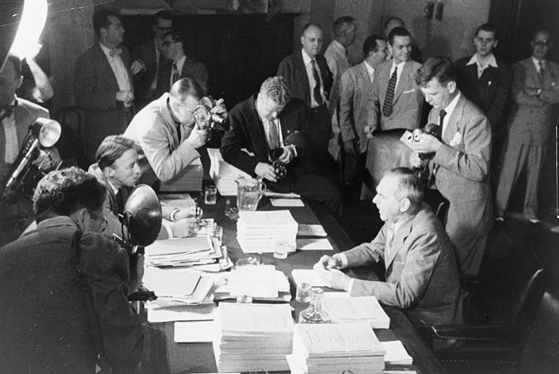
Source: Dean Acheson, Honorable Survivor
In this section you will evaluate the influence of communist China on the Korean War. Read each section carefully and complete the activities that follow.
Prelude to War

Source: Dean Acheson, Honorable Survivor
In early 1950, United States Secretary of State Dean Acheson spoke about America's zone of protection in the Pacific region (pictured above). The Soviet Union, China, and North Korea paid attention to the Secretary's speech, and they concluded that the Korean Peninsula was clearly out of that defense perimeter. Taken as an "all clear" sign, columns of North Korean soldiers, supported by Soviet-made tanks and backed by the Chinese, crossed the 38th Parallel line on June 25th, 1950.
Does this reflect a Chinese influence on the Korean War?
![]() Click on "YES" or "NO."
Click on "YES" or "NO."
Harry S. Truman
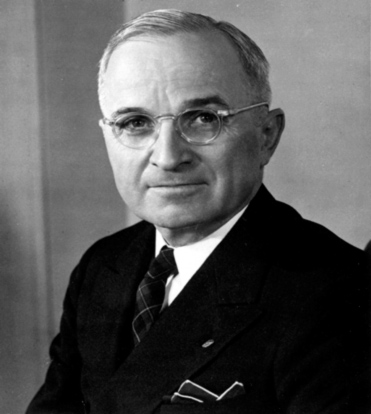
Source: Harry Truman, Harry S. Truman Library & Museum
China became threatened by the unstable events on the Korean Peninsula and the United Nation's resolution to defend South Korea from the North Korean invasion. Premier Zhou Enlai expressed China's concerns to the United Nations and warned that in safeguarding Chinese national security, they would intervene against the United Nations Command in Korea. Viewed simply as a threat, United States' President Harry S. Truman dismissed China's entrance into the war and even after China participated in a few small scale operations just across the border in North Korea, the President still did not believe China was in the war for the long haul.
Does this reflect a Chinese influence on the Korean War?
![]() Click on "YES" or "NO."
Click on "YES" or "NO."
Chinese Invasion
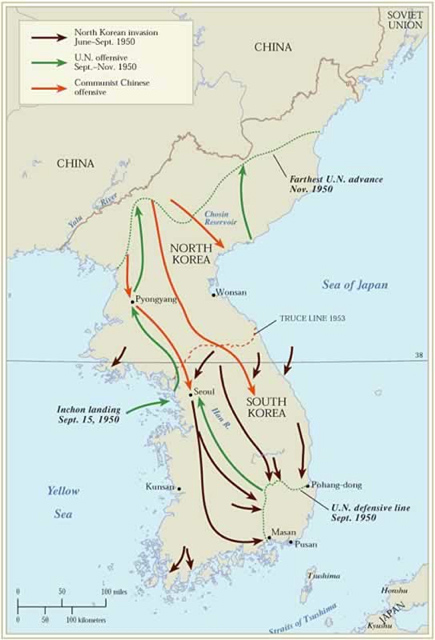
Source: Chinese Invasion, Wikispaces
President Truman's suspicions on China were seriously flawed. China not only shared a common border with North Korea, but was also a communist ally to the Soviet Union. On November 25th, 1950, Chinese forces countered United Nations forces in North Korea.
Several South Korean divisions and the United States Second Division were severely destroyed forcing the rest of the UN command to rapidly withdraw to escape destruction. By January, 1951, a renewed enemy pushed the United Nations forces all the way back to the 38th parallel entering parts of Seoul, the capitol of South Korea. (See red arrows showing communist China's advancements after entering the war.)
Read the information above and examine the map; determine if it displays evidence of Chinese influence on the Korean War.
![]() Click on "YES" or "NO."
Click on "YES" or "NO."
UN Air and Naval Support
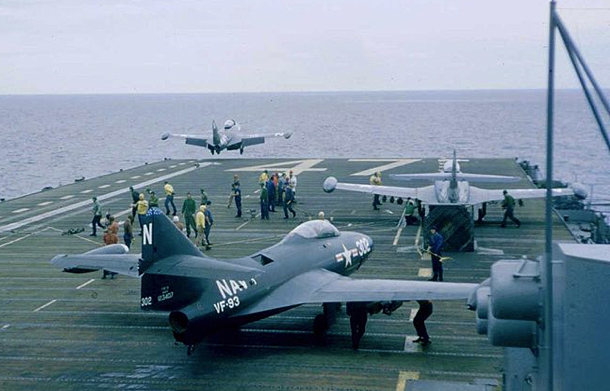
Source: F9F panther CV-47, Wikipedia
The UN Command still had naval and air superiority. Troops on the ground were supported with support throughout the cruel winter months that followed. On the other hand, Chinese and North Korea forces south of the 38th parallel were badly depleted because their supply lines were ambushed by those same air and naval forces of the United Nations. The Chinese army was exhausted. Starting on January 25, 1951, Lieutenant General Matthew Ridgway's Eighth Army assisted by land and sea-based airpower, pushed northward in a sharp series of carefully-planned offensives.
By late April, they had recaptured almost all of South Korea and were digging in along a serpentine front line generally well above the old 38th Parallel border. In mid-May, the enemy pushed back, gaining ground across the peninsula, but at such great expense that UN forces quickly recovered most of what had been lost, and more. Only in the west, where terrain was unsuitable for an advanced front line, were the Communists allowed to retain some formerly South Korean territory.
After reading the passage and analyzing the photo, determine if the communist Chinese had an impact on the Korean War or no impact on the Korean War.
![]() Click on "YES" or "NO."
Click on "YES" or "NO."
Cease-Fire Agreement
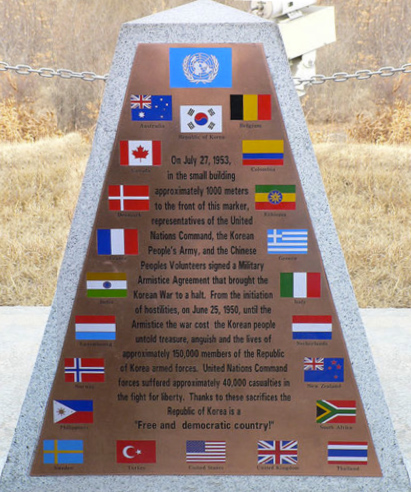
Source: Armistice plaque, Nagyman, Flickr
The end of the Korean War came on July 27, 1953. After nearly two years of negotiations an armistice was reached and fighting stopped. The 38° Parallel was determined to be the division of North and South Korea. A demilitarized zone or DMZ was set up to serve as a buffer zone between the two countries. The casualties of the Korean War were extremely high: 40,000 UN soldiers, 150,000 North Korean, and an untold number of Chinese paid the ultimate sacrifice in the war.
What do you think China's overall influence was on the Korean War?